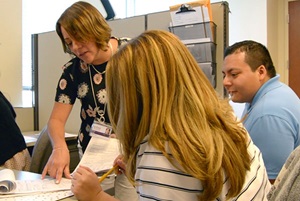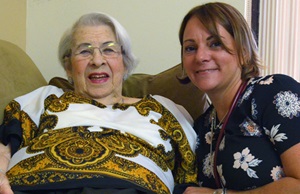Meet Erika, a VITAS Hospice Nurse
Why Does Erika Avila, RN, Love Her Job?
Erika Avila is a hospice nurse on a home care team with VITAS Healthcare. That means she spends her day working in other people’s homes, visiting terminally ill patients and communicating with the other members of her team—physician, social worker, chaplain, aide, volunteer, bereavement specialist and their team manager—about how each patient is doing, how the family is doing, what their needs are and if and how the plan of care needs to be changed.
Erika knew when she became a nurse that she wanted to work in the home care setting, and she has done that for 19 years now—all the time she has been a registered nurse.
“I knew I didn't want to be in the hospital setting or in the doctor's office,” she explains. “I wanted that one-on-one time, that personal time with the patient, when I can actually listen to their needs, address their needs, educate them. It’s a more personal level.
“To me, that's what nursing is about. I became a nurse because I have a fascination with the human body and a passion to take care of others and make a difference. I became interested in hospice while I was in nursing school, when I completed a rotation in hospice.”
Hospice “Runs Through My Veins”
Four years ago, Erika had already made the move to hospice when she attended a job fair. She applied for a position at VITAS and was hired the next day.
“I accepted the job with VITAS because, besides the many benefits they offer, VITAS allows me one-on-one time with my patients. And I believe in their values, that we take care of each other, patients and families come first and we make a difference.
“VITAS stands by their values and their mission,” Erika says. “They stand by us as employees. They trust that, as professionals, we have the knowledge and skills to go into the home and work independently, without someone breathing down our back about what to do or what not to do. We have the freedom and trust to provide care in the home. My passion for VITAS has grown; my passion for hospice has strengthened. It runs through my veins.”
Family, Not Team
 The team aspect of working for VITAS made Erika feel like she was never left on her own; she had mentors and training until she was comfortable taking on her own census of patients. Even four years later, Erika relies on the expertise of her teammates. Only they don’t think of themselves as a team; Erika says they call themselves family.
The team aspect of working for VITAS made Erika feel like she was never left on her own; she had mentors and training until she was comfortable taking on her own census of patients. Even four years later, Erika relies on the expertise of her teammates. Only they don’t think of themselves as a team; Erika says they call themselves family.
“VITAS gives you good training to be successful at this job,” she says. “When you first start, you have classes on documentation, end-of-life care, pain management, the pharmacy. You shadow other nurses who have been working with the company for a few years. And they start you out with a low census. So when I went out on my own, I was pretty confident with what I was doing.
Seeing Her Patients
“Today I have a census of 16–17 patients, and I see my patients at least once a week, depending on how they're doing. They’re used to me coming at a certain time because I have them all on a schedule. If anything changes because another patient has an emergency and I have to switch, I let them know. Usually our patients are very understanding.
“So my day starts with an 8 a.m. page from the office giving me the information on the census of the team: any admissions, any discharges, any transfers that we’ve had, any Telecare® calls. At 8, I’m usually already at my first patient’s home. So when I finish my visit, I recheck my schedule and make adjustments as needed. From there, I see anywhere from six to seven patients throughout the day.”
But patient visits aren’t the only thing that fill her day. “I receive numerous phone calls from doctors, pharmacies, the office,” she says. “I order medications for patients. There is continuous communication with the other members of my team and the office and the doctors going back and forth.
And again, there is her team to back her up. “Right now, we’re a team of 16 strong, professional, compassionate, dedicated end-of-life care professionals,” Erika enthuses. “We all share the same passion for VITAS and for hospice and the care we provide. We are very united. Thick, thin—doesn’t matter what one needs, we’re there. And that includes our manager. We have a very strong manager who leads by example, and he treats us with respect, as we do each other.
A Team Approach, An Individual Approach
She gives an example. “The biggest challenge I have as a hospice nurse is when I have a family who's having a hard time coming to terms with the prognosis of their family member. Getting them to the point of acceptance sometimes can be difficult. It takes a lot of patience and a lot of compassion and a lot of education. In cases like that, I involve the chaplain and the social worker on my team to come in and help with additional support with the family until they are able to deal better with what's going on with their loved one.
“And VITAS provides the tools we need,” Erika adds. “They're always giving us continuous education classes here in the office: the latest in end-of-life care, different disease processes, etc. Our medical directors and team doctors are always available to answer any questions we may have about a patient.”
Erika never seems hurried or cookie-cutter in her approach to a patient. Every patient is unique, her only concern while she is there. But there are experiences that stay with her long after the patient has died.
“One of the times I made a difference,” she recalls, “was with a fairly young veteran patient. At VITAS we take great pride in taking care of our veterans, so we set up a bedside salute for him. We presented him with a flag, a certificate and a handmade quilt that our volunteers make.
“The look on that man's face when we did this was indescribable. Words cannot describe the happiness and pride that man felt. It's something I'm never going to forget; every time I drive by that neighborhood, I think of that day.
“Some days are very quiet,” she says. “Others are busy, like any job. But when my day is over, I feel humbled. I’m blessed. I know that I’ve made a difference that day.”
Visiting Nella
 Erika is in her car. Because she works in a densely populated area, all her patients live within two adjacent zip codes in the city.
Erika is in her car. Because she works in a densely populated area, all her patients live within two adjacent zip codes in the city.
“A lot of time is spent in the car because of the traffic,” she acknowledges. “But because my patients are fairly close to each other, the commute time isn't that bad. The travel time between patients for me is usually two to five minutes. The longest commute I have from patient to patient is about 12–13 minutes. I use my own car, but VITAS reimburses me for miles. We get paid bi-weekly and that’s when we get reimbursed for the miles we drive.”
“I have a census of patients. I don't get told which patient to see. It's my responsibility to schedule my patients as I see fit. That's the freedom and flexibility that VITAS gives us.”
Erika will see Nella today, a patient with end-stage Parkinson’s disease that Erika has been seeing for several months. Erika saw Nella’s husband too; both were VITAS patients. They also had a full-time private-care nurse who lived in their home. The husband died just over a month ago.
“Nella is a very pleasant Spanish lady. We'll be greeted by her caregiver, Alta,” Erika predicts. “Nella will be sitting in her recliner, just staring at the TV or reading. She's alert, she's oriented, she's able to answer questions. She has her days where she is obviously sad because her husband died and they were together for—I think it was 64 years.
“I will do a complete assessment on her, ask her how she slept, how she's been doing. I will check her medications. Check to see if she needs any refills on any medications. I'll put together her pillbox for the week. And as I check her, I’ll just go on asking her questions about how she's feeling emotionally and physically.
“While I'm doing my visit, I'm also completing my nurse's note, which is the full-body assessment. When I finish, I let Nella and Vera know when my next visit will be. I tell them if they need anything, to go ahead and call the office, we're always available 24/7 for any emergencies. And we kiss and hug goodbye, and that's the end of my visit.”
‘Go for It’
Erika loves her job; she urges others she thinks have the heart for hospice to “go for it.”
“I always say working in hospice is a roller coaster of emotions,” she says. “I laugh, I cry with my patients and families, I become a part of their life and they become a part of mine. They bring you into their lives as if you're a family member, as if they've known you forever. They embrace you with love, open arms, and complete and unconditional trust. And I'm with them every step of the way. I tell them, ‘I'm going to be with you to the end.’”
She admits that the connection a good hospice nurse makes with patients also makes their deaths difficult. And it’s made Erika grow, she believes. “I've helped many families watch their loved ones take their last breath,” she says. “There's something sacred about being able to participate in that moment at the end of life. It puts your life into perspective. It makes you realize that it's the simple things that matter. Working with VITAS the last four years has made me a better human being.
“I would tell someone who's considering a role with VITAS to go for it. I don't think they'll regret the decision to work for a company that stands by their values and their mission and respects and supports us as professionals.
“I think a person with compassion, dedication and a sense of humanity will make a great hospice nurse. I always tell people, ‘Don't ever lose your humanity.’ Because we are taking care of someone's loved one—the person who’s most important to other people in the world. I always tell them, ‘Pretend that's your family member. Pretend that's someone you love and treat them with the same respect and love and compassion that you would want another caregiver to treat your family member.’
“Going into a patient's home and having a personal connection with them is important to me because I am a very sensitive person. And our hospice patients are so appreciative of what we do. We walk into that home and we are their angels. We are their life support. We're everything to them. So that makes you feel great as a human being. You know you're making a difference. It makes you feel loved by someone else. It's an unconditional love, it's an unconditional trust that you will not find anywhere else.
“And to me, that's hospice. That's why I do it. I mean, my patients are awesome, they really are.”